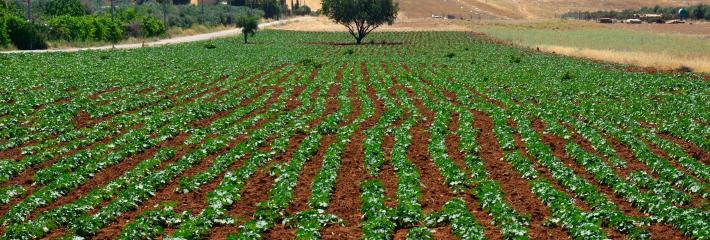Enhancing Resilience and Sustainability of Agriculture in the Arab Region

The Arab region is facing severe natural water scarcity, evident from the long-term annual average precipitation at below 350 mm. Simultaneously, demand for water is increasing with water withdrawals exceeding water availability from internal sources. The agriculture sector is the largest user of water resources in the Arab region, yet, water use efficiency is characterized as being low due to wasteful irrigation practices and low investment levels in irrigation infrastructure. In addition to challenges related to water access, the agricultural sector in many Arab countries also faces challenges related to access to agricultural inputs, market access, poor infrastructure and storage facilities, in addition to weak investment in agricultural research and development, political instability, and climate change.
In light of the above, comes the need to intensify efforts towards enhancing irrigation water efficiency, access to data, research outputs and new agricultural technologies, in addition to securing funding requirements and access to markets towards enhancing resilience and sustainability of the agricultural sector ESCWA is therefore implementing a Development Account project on “Enhancing resilience and sustainability of agriculture in the Arab region” for that purpose. This new project is based on the ESCWA project on “Enhancing food and water security through cooperation and capacity building in the Arab region” funded from the Swedish International Development Cooperation Agency (Sida).
The project aims at enhancing national capacities in addressing resilience and sustainability of the agricultural sector, considering the major challenges facing the Arab region including water scarcity, prevailing conflicts and climate change. The project will also enhance the resilience of small farmers and rural populations affected by poor access to irrigation water, data, research outputs and climate-smart agricultural innovations and technologies; finance at the small-scale farm level; and access to markets.
The project’s Expected Accomplishments are:
- Enhanced national capacities of targeted Arab countries to optimize the use of available conventional and non-conventional water resources for supplementary irrigation, thus contributing to increased resilience and sustainability of agriculture.
- Enhanced national capacities4 of targeted Arab countries to utilize the SDGs Means of Implementation (technology, research outputs, access to finance and markets) for increasing resilience and sustainability of agriculture.
The project will involve the development of training material and capacity building activities at the national level in the project’s focus countries, and policy guidelines are to be developed at the wider regional level. The combination of regional guidelines development and national capacity building is envisaged to inform decision making for enhanced integrated policy development towards enhancing the agricultural sector. Partners in the project include the Arab Center for the Studies of Arid Lands and Dry Zones (ACSAD), the FAO Regional Office for Near East and North Africa and the Arab Organization for Agricultural Development (AOAD). Project’s activities will focus on three targeted Arab countries which are Jordan, Lebanon and Palestine, selected due to the pressing agricultural challenges that they face.





